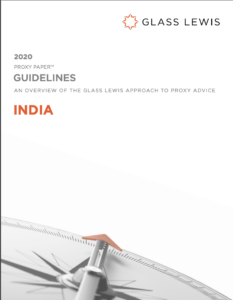Glass Lewis’ Policy Guidelines provide an overview of our approach to governance and proxy research. Updated 2020 guidelines are now available for India.
In developing our policies, we consider a diverse range of perspectives and inputs, with ongoing analysis of regulatory developments, academic research and evolving market practices as a starting point. We incorporate insights gained from discussions with institutional investors, trade groups and other market participants, as well as meetings of the Glass Lewis Research Advisory Council. Further, our engagement meetings with over 1,500 public companies each year help shape our guidelines by adding essential market- and industry-specific context.
Glass Lewis evaluates these guidelines on an ongoing basis and formally updates them on an annual basis. Among other updates, the 2020 guidelines for India address the following topics:
BOARD COMMITTEE INDEPENDENCE
As the Securities Exchange Board of India is permitting some IPO companies to have dual-class share structures, we have updated our policies in relation to board committee independence where companies have SR Shares in addition to equity shares.
CORPORATE GUARANTEES
We have added our policy for how we will assess the granting of corporate guarantees by companies to other entities.
RETIREMENT BY ROTATION
We have revised our policy relating to retirement by rotation. Going forward, we will not actively recommend against the appointment of CEOs or managing directors if their term of office is not subject to retirement by rotation. We have updated our consideration of a director’s independence, based on prior employment as an executive and/or whole-time director. We will apply a three-year look-back period for all past relationships. A non-executive director who has been employed by the company as a senior executive is not considered to be independent unless there has been a break of at least three years between leaving that employment and becoming a non-executive director of the company.
IMPACT OF COVID-19 PANDEMIC
The COVID-19 pandemic has caused significant disruption to people and companies around the world, including in India. Glass Lewis expects all governance issues and most proposal types to be impacted by the pandemic. We will approach these issues using the contextual “case-by-case” approach outlined in these policy guidelines, with an emphasis on prioritizing timing, certainty, disclosure and voting on any affected proposals. In particular, we believe the following issues will be relevant to Indian companies during the 2020 proxy season, and have adjusted our policy approaches accordingly:
- As the finances of companies globally have been impacted by the pandemic, we understand that companies may seek to raise funds through equity issuances. Although we will observe our practice to support equity issuances without pre-emptive rights that is below 20% of issued share capital, should a company demonstrate a significant need for capital beyond such a level because of the COVID-19 pandemic, based on the depth of a company’s disclosure, we may evaluate such capital increases on a case-by-case basis.
- Where companies seek shareholder approval for varying types of remuneration proposals that relate a company’s profitability, we will expect clear disclosure and compelling rationales where a company may seek to set minimum remuneration or waive excess remuneration due to losses resulting from COVID-19. Otherwise, we will follow our general policy approaches.
- Lastly, if a company’s financial reporting is impacted by travel restrictions and/or an auditor is unable to issue an unqualified opinion for such reasons, we will evaluate on a case-by-case basis the proposal(s) to approve the adoption of a company’s financial statements.
In response to the pandemic, the Ministry of Corporate Affairs has allowed companies to hold their annual general meetings virtually, even though Indian companies have been able to hold postal ballot meetings for extraordinary general meetings. Companies will be allowed to hold their AGM electronically until the end of the calendar year 2020.
Should the Ministry of Corporate Affairs, the Securities and Exchange Board of India, or other relevant regulatory bodies release new regulations during the AGM season, we may adjust our policies and approaches as needed.
We believe in transparent, aligned and well-governed markets in service of our purpose to empower clients seeking to maximize long-term shareholder value. As such, investor clients and non-clients, issuers and other stakeholders are invited to comment on these updates, as well as any aspect of the Policy Guidelines, at any time throughout the year. Your feedback will be taken into consideration as we continue to evaluate our guidelines on an ongoing basis and formally update them annually.
